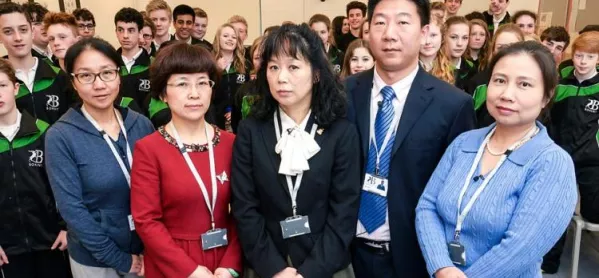Over the last few weeks, millions across the nation have tuned in to the fly-on-the-wall documentary Are Our Kids Tough Enough: Chinese School. This social experiment saw Chinese-style schooling imposed on 50 students at Bohunt School in sleepy Hampshire.
I had hoped that this documentary, set as it was in an outstanding comprehensive school, would challenge the narrative arc of so many recent education documentaries, which have portrayed behaviour among young people in Britain’s schools negatively.
I had hoped it would change the discourse to one of seeing best practice, exceptional leadership and behaviour for learning.
Sadly, the programme failed to meet this expectation. So, failing that, what can we learn from this experiment and the system that puts China on top of the Pisa league tables for maths, science and reading?
As a society, we are often criticised for being a ‘nanny-state’. We have a free national health service and housing for those who need it. We are protected and supported by our leaders and rarely feel the need to stop and think about how our life compares to those much less fortunate across some ponds. Why is this relevant to Chinese School? Well, Chinese School is about the survival of the fittest. Those that are disciplined, invest time and effort in their own successes will achieve, and those that wait to be handed the solutions on a platter are destined to another path.
In China and Japan, students are expected from age 6 to complete self-study every day to confirm their knowledge or suffer trailing the pack. We saw Year 9 students compete in athletics with a challenging pass mark. Some watching the least athletic students in tears will be sympathetic and want to console. Some will say they need to get fitter. Who’s right? In Amy Chua’s controversial book Battle Hymn of the Tiger Mother, she admits to making her daughter train for hours each day to perfect the violin, to threatening to destroy her daughter’s doll house if she performed poorly in a competition and that nothing below an A in a test will suffice. Amy’s daughters are now accomplished musicians and graduates of Ivy League universities.
However, is the aim of education to produce results in tests or to foster an unalloyed joy for learning and for challenging the status quo?
Chinese School saw students receive a colossal amount of teacher-led instruction with the expectation of quick note-taking, repetition and memory. This is different to the freedom to question and be creative that the British students have become accustomed to. As a result of this change, students became unfocussed, the least rebellious suddenly found a voice of challenge and behaviour deteriorated with rapidity.
But did this flawed system’s ultimate success risk “sending us back to the dark ages”, as the head, Mr Stowger, worried it would?
It depends on your perspective. In the UK, we are faced with an exam-based system, schools are compared against each other by GCSE results and if you want to get a job in a school, much of the success criteria will be around those results. The Chinese teaching method conditions and trains students to excel in exams. If intellectual curiosity isn’t rewarded in our system, then perhaps the Chinese method is preferable in our classrooms.
There is, however, much more to education than exam results. Successful young people must be disciplined, respectful of authority and autonomously driven towards their goals; rigorous education and high expectations must not be a novelty. As we’ve seen tonight, you can throw in five teachers from China into an English school in the middle of the year with a new routine, culture and higher expectations and it will produce results.
We need to make a decision though; if we are only measuring success based on the ability to memorise key information for exams, the Chinese method trumps the British. But what if we’re not?




